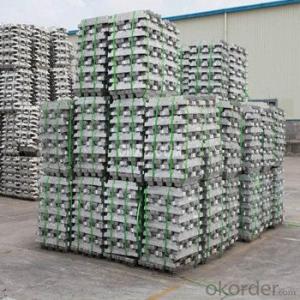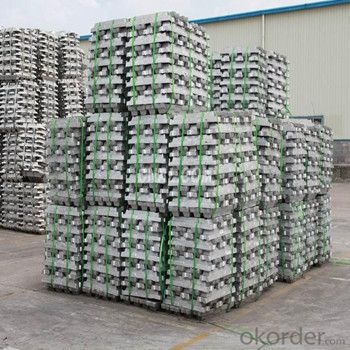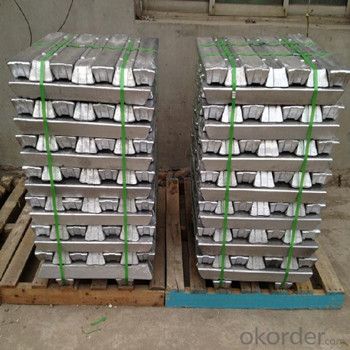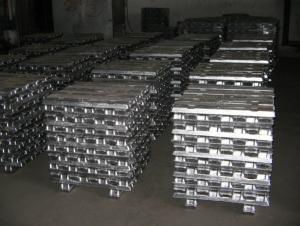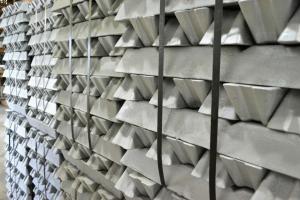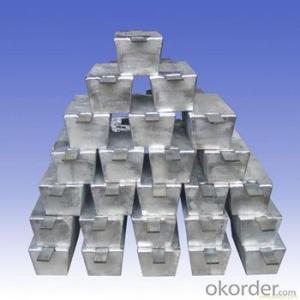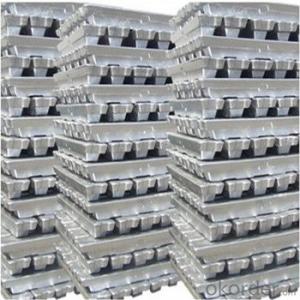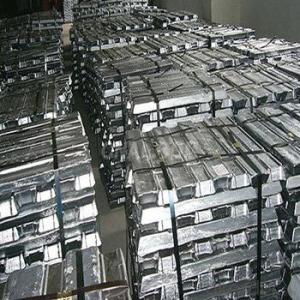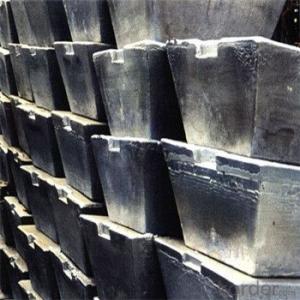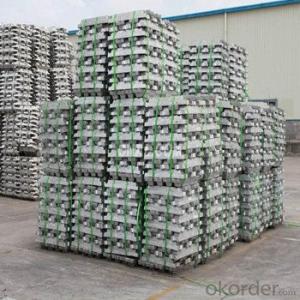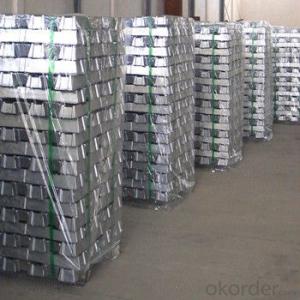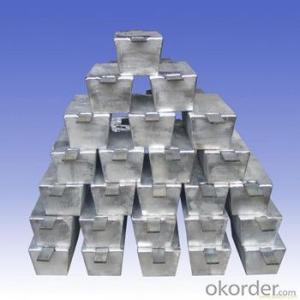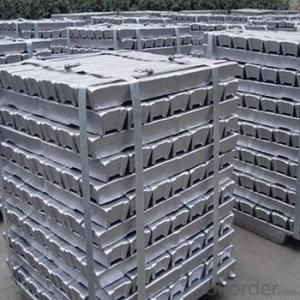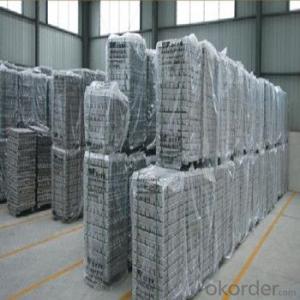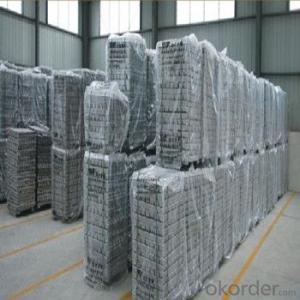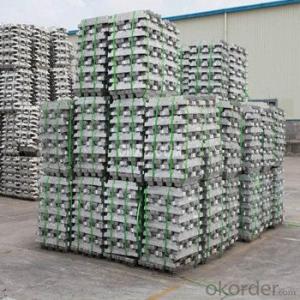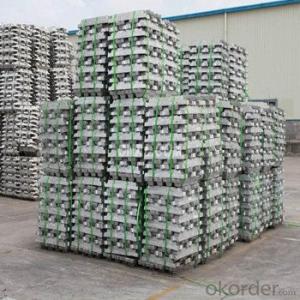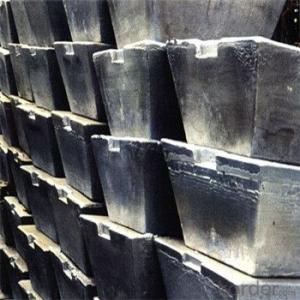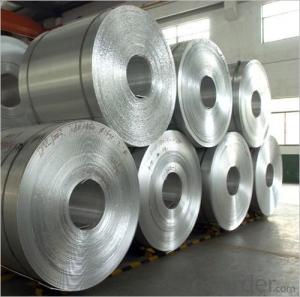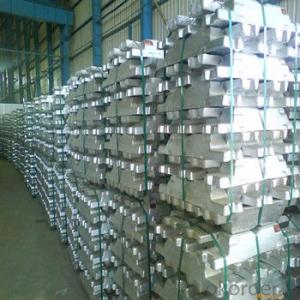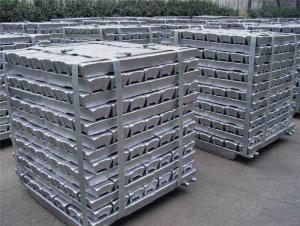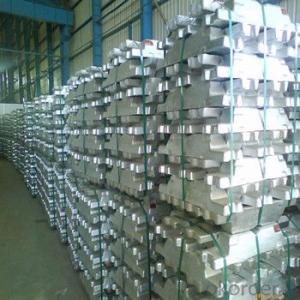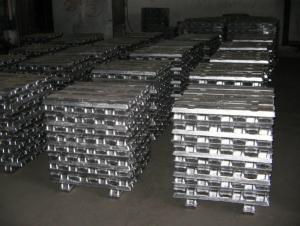Aluminum Ingot With Different Purity For Choice 2015
- Loading Port:
- China main port
- Payment Terms:
- TT OR LC
- Min Order Qty:
- 10000 m.t.
- Supply Capability:
- 100000 m.t./month
OKorder Service Pledge
OKorder Financial Service
You Might Also Like
Pure Aluminum Ingot Used for Industry
1.Structure of Aluminum Ingot Description
A material that has been cast into a shape in order to be transported and processed easier than in an unprocessed form. An ingot is typically rectangular in shape, which allows it to be stacked. Ingots are most commonly associated with metals, with ingots of gold held in the vaults of banks and brokerages being popular images.
2.Main Features of the Aluminum Ingot
•High Purity
•High strength
•Fast melting
•Best price
•Good after-service
3. Aluminum Ingot Images
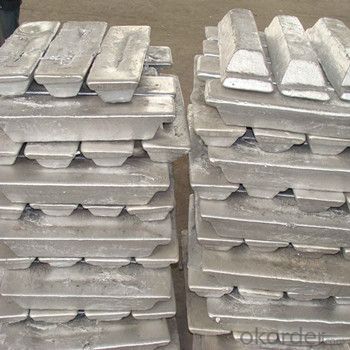
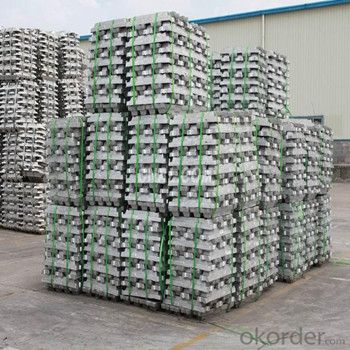
4. Aluminum Ingot Specification
| 500*500*6mm | 500*500*8mm | 1000*500*20mm | 1000*500*15mm |
| 1000*500*8mm | 1000*500*10mm | 1000*500*30mm | 1000*500*6mm |
| 1800*800*20mm | 1800*800*10mm | 2000*1000*20mm | 2000*1000*10mm |
5.FAQ of Aluminum Ingot
We have organized several common questions for our clients,may help you sincerely:
①How about your company?
A world class manufacturer & supplier of castings forging in carbon steel and alloy steel,is one of the large-scale professional investment casting production bases in China,consisting of both casting foundry forging and machining factory. Annually more than 8000 tons Precision casting and forging parts are exported to markets in Europe,America and Japan. OEM casting and forging service available according to customer’s requirements.
②How to guarantee the quality of the products?
We have established the international advanced quality management system,every link from raw material to final product we have strict quality test;We resolutely put an end to unqualified products flowing into the market. At the same time, we will provide necessary follow-up service assurance.
③How long can we receive the product after purchase?
In the purchase of product within three working days, We will arrange the factory delivery as soon as possible. The pecific time of receiving is related to the state and position of customers.Commonly 7 to 10 working days can be served.
- Q: What are the dimensions of a typical aluminum ingot?
- The dimensions of a typical aluminum ingot can vary depending on the specific industry and application. However, a commonly used standard size for aluminum ingots is approximately 20 inches (50 centimeters) long, 6 inches (15 centimeters) wide, and 2 inches (5 centimeters) thick. These dimensions are not fixed and can be adjusted based on the requirements of the customer or the specific production process. Additionally, there are various other sizes and shapes of aluminum ingots available in the market, ranging from smaller sizes used for specialized applications to larger ingots used for industrial purposes.
- Q: How are aluminum ingots stored and transported?
- Aluminum ingots are typically stored and transported in a careful and systematic manner to ensure their safety and quality. Firstly, ingots are usually stored in warehouses or storage facilities specifically designed for handling metals. These facilities are equipped with adequate ventilation, temperature control, and protection against moisture to prevent any damage or contamination. To store aluminum ingots, they are typically stacked on pallets or placed in racks, depending on the size and weight of the ingots. The ingots are arranged in a way that allows for easy access and ensures stability during storage. In some cases, ingots may be individually wrapped or covered with protective materials to prevent scratching or surface damage. When it comes to transportation, aluminum ingots are usually moved using various methods depending on the distance and quantity. For shorter distances, smaller quantities of ingots can be transported using forklifts or hand trucks. In these cases, it is important to secure the ingots properly to prevent any movement or potential falling during transport. For longer distances, larger quantities of aluminum ingots are typically transported by trucks, trains, or ships. These transportation methods often require specialized containers or trailers designed to hold the ingots securely and protect them from external factors. In some cases, ingots may be loaded into shipping containers or placed on flatbed trailers. It is crucial to ensure proper handling and securing of aluminum ingots during transportation to minimize the risk of damage or accidents. The transportation containers or vehicles should have appropriate padding or cushioning to absorb any potential shocks or vibrations that could potentially impact the ingots. Overall, the storage and transportation of aluminum ingots involve careful planning, adherence to safety protocols, and the use of specialized equipment to maintain their quality and integrity throughout the process.
- Q: Now refining aluminum ingot profits? What are the main factories?
- The main fuel of the pot for coke, coal and coal, the effect is not good, the process is very simple, is to put the cans back into the pot melting aluminum water, with a spoon to scoop out the mold to cast into ingots, the need to pay attention to is because cans belongs to the thin material industry often said, it is easy to burn, the best the method is the first of the aluminum water in the pot, and then put the cans or pressed into blocks and then cast.
- Q: What are the different machining techniques for aluminum ingots?
- Some of the different machining techniques for aluminum ingots include milling, drilling, turning, and grinding.
- Q: How are aluminum ingots used in the production of doors and windows?
- Aluminum ingots are used in the production of doors and windows as they are melted down and shaped into extrusions, which are then used to create the frames and profiles of the doors and windows. These extrusions provide the structural strength, durability, and corrosion resistance necessary for high-quality door and window frames.
- Q: Want to melt the cans into aluminium ingots, but what about iron cans?
- Aluminum is the third largest in the earth's crust, second only to oxygen and silicon, and is the most abundant metal element in the earth's crust. The development of the three important industries, aviation, architecture and automobile, requires that the material characteristics have the unique properties of aluminum and its alloys, which will greatly benefit the production and application of the new metal aluminum. Applications are very extensive.
- Q: What is the melting point of aluminum ingots?
- The melting point of aluminum ingots is approximately 660 degrees Celsius or 1220 degrees Fahrenheit.
- Q: Can aluminum ingots be recycled?
- Indeed, aluminum ingots possess the ability to undergo recycling. Being a remarkably recyclable substance, aluminum undergoes a process of melting down the ingots, subsequently reusing the metal to fabricate fresh commodities. The act of recycling aluminum ingots not only aids in preserving natural resources but also results in substantial energy savings when juxtaposed with the production of aluminum from raw materials. Moreover, the recycling of aluminum plays a pivotal role in waste reduction and mitigating the environmental consequences linked to mining and extraction procedures.
- Q: I would like to ask, aluminum water poured into the mold, what should pay attention to? Aluminum solidification in the mold after the aluminum ingot, how can I get it out?
- When the mould is opened, the hammer is used to mark the template, and the 4 shafts on it strike another template to make it open. Die casting equipment is generally equipped with a die, directly push the sub templates, mold opening.
- Q: How to add zinc when producing aluminium ingot?
- If you want to use the post deployment steps are as follows: first, a certain number of scrap melting - Sampling components -- assuming you require zinc component is just 2, if the component is not enough, add an equal amount of zinc calculation, the calculation method is very simple
Send your message to us
Aluminum Ingot With Different Purity For Choice 2015
- Loading Port:
- China main port
- Payment Terms:
- TT OR LC
- Min Order Qty:
- 10000 m.t.
- Supply Capability:
- 100000 m.t./month
OKorder Service Pledge
OKorder Financial Service
Similar products
Hot products
Hot Searches
Related keywords
